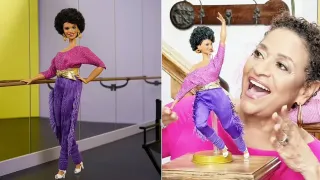
6 hours ago
Jennifer Lopez Responds to Heather Morris’ Claim She Cut Dancers for Being Virgos
READ TIME: 3 MIN.
The entertainment world has been abuzz after a resurfaced rumor alleged that pop superstar and actor Jennifer Lopez once dismissed dancers from an audition solely for being Virgos, based on their zodiac sign. The claim initially emerged in 2022 when Heather Morris, known for her role on Glee and as a professional dancer, recounted the story on the Just Sayin’ With Justin Martindale podcast. Morris admitted she was not present at the audition herself, but recounted the anecdote as told to her by a friend, stating that Lopez entered an audition room after a long day and asked dancers to raise their hands if they were Virgos, after which those dancers were allegedly dismissed from consideration for Lopez’s tour .
This story quickly gained traction online due to its unusual premise and the high-profile nature of Lopez’s career. The scenario—where a celebrity’s hiring decisions might be influenced by astrology—sparked significant discussion, especially on social media platforms like TikTok, where users debated the veracity and implications of the claim .
Appearing on Watch What Happens Live with Andy Cohen, Jennifer Lopez was directly asked whether she had ever cut dancers from her auditions for being Virgos. Lopez responded with a mix of humor and clarification. She acknowledged that she enjoys joking around and suggested that her comment in the audition was not meant to be taken seriously. Lopez stated, “I think I had maybe just had an issue with a Virgo, and I was like, ‘If anybody’s a Virgo here, get out!’” She emphasized that the remark was intended as a joke, and not as an actual audition criterion .
Lopez went on to assert, “But I didn’t mean it … they could walk away and say that, but I’m sure they knew I was joking — or maybe they felt like I wasn’t. But it was absolutely a joke.” Her comments appear to address both the specific claim and the broader implication that she would discriminate based on astrology, something she firmly denied .
Despite Lopez’s explanation, skepticism remains among some fans and observers. On TikTok and other social media, users weighed in, with many expressing doubt about the sincerity of her response. Comments ranged from, “So then she DID fire dancers because they were Virgos” to “If it’s not a flat out ‘NO’ then it’s a Yes!” and “That answer means yes she did it and she was not kidding as much as she wants to say different now” .
Others pointed out the potential harm in making such jokes in high-stress environments like auditions, where participants may take even offhand remarks seriously. As one commenter noted, “If they really did leave and no one stopped them and told them it was all in fun… was it really ?” .
Astrology has long played a role in popular culture, but using it as a basis for employment decisions raises questions about fairness and discrimination. While there is no evidence that Lopez or her team has systematically excluded anyone based on their astrological sign, the rumor touches on broader issues of bias in casting and hiring within the entertainment industry. Professional dance auditions are notoriously competitive, and even lighthearted comments from those in power can have unintended consequences for hopeful performers .






